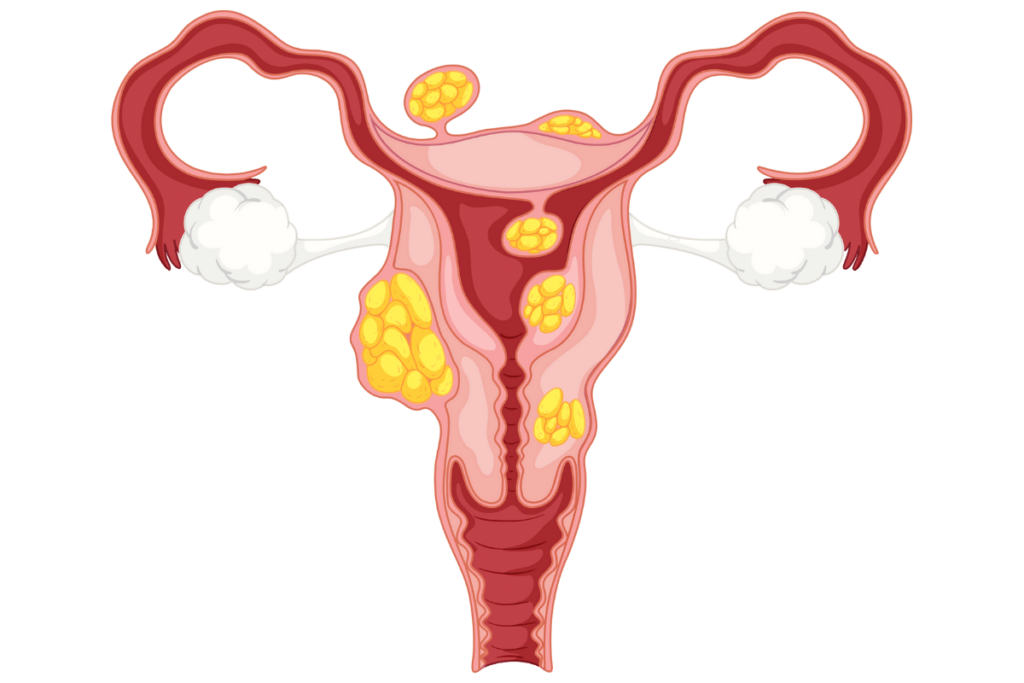

Experience Relief from Uterine Fibroids with Minimally Invasive Uterine Artery Embolization
Book Appointment

What are Uterine Fibroids?
Uterine fibroids and uterine artery embolization are non-cancerous growths that develop in the uterus, often causing symptoms such as heavy menstrual bleeding, pelvic pain, and pressure. If you’re experiencing these issues, finding a treatment that offers effective symptom relief and minimal invasiveness is crucial.
Introducing Uterine Artery Embolization
Uterine Artery Embolization (UAE), also known as Uterine Fibroid Embolization (UFE), is a minimally invasive procedure aimed at treating uterine fibroids, non-cancerous growths that can develop within the walls of the uterus. This innovative technique offers numerous advantages over traditional surgery, including a shorter recovery time, preservation of the uterus, and minimal scarring. This innovative treatment, led by Dr. Bhavani Shankar Manam, a renowned specialist in interventional radiology, offers an effective alternative to traditional surgical options.
The Benefits of Uterine Artery Embolization
Minimally Invasive Procedure
With UAE, you can say goodbye to the risks and longer recovery times associated with traditional surgery. Our highly skilled team performs UAE through a small incision, resulting in smaller scars, less pain, and a quicker return to your daily activities.
Preserve Your Uterus and Fertility
Unlike some surgical options, UAE allows you to keep your uterus intact, making it an ideal choice for women who wish to preserve their fertility or avoid a hysterectomy. You can experience symptom relief without compromising your reproductive health.
Improved Quality of Life
UAE has proven to be highly effective in alleviating the symptoms caused by uterine fibroids. Women who undergo UAE often experience significant improvement in heavy menstrual bleeding, pelvic pain, and pressure symptoms, leading to a better overall quality of life.
Outpatient Procedure for Convenience
We understand the importance of your time and comfort. That’s why UAE is typically performed on an outpatient basis, allowing you to return home on the same day. This eliminates the need for an overnight hospital stay and ensures a smoother recovery process.
Lower Complication Rates
UAE has been associated with lower complication rates compared to traditional surgery. While every medical procedure carries some risks, our experienced team takes all necessary precautions to minimize potential complications and ensure your safety throughout the process.
Expertise and Personalized Care
When it comes to your health, you deserve the best care possible. At the Vascular and Interventions Clinic, our team specializes in UAE and has a wealth of experience in performing the procedure. You can trust us to provide personalized care tailored to your specific needs, ensuring optimal outcomes.
Take the First Step towards Relief
Don’t let uterine fibroids hold you back from living your life to the fullest. Schedule a consultation with our experienced team today to discuss whether UAE is the right choice for you. Experience the benefits of this minimally invasive procedure and reclaim your freedom from fibroid-related symptoms.
Call Now For Quick Appointment
FAQ's
Uterine fibroids are lumps that can grow in a woman’s uterus. They are not related to varicose veins. These growths are usually not cancer, but they can cause problems like pain and heavy periods. If someone has uterine fibroids, they might see a specialist called a gynecologist or a fibroid specialist. The doctor can suggest different treatments, like medicine or surgery, to help with the symptoms. It’s important to talk to a healthcare provider to figure out the best plan for dealing with uterine fibroids.
The exact cause of uterine fibroids is not fully known. They are not related to varicose veins. However, hormones, especially estrogen and progesterone, may play a role in their growth. Sometimes, family history or genetics can also contribute. While a varicose vein specialist doesn’t typically handle uterine fibroids, a healthcare provider like a gynecologist can help understand the causes and recommend appropriate treatments for managing them.
Uterine fibroids can cause different symptoms. Some people might feel pain or pressure in their lower belly. Others might have heavy periods or bleeding between periods. Sometimes, fibroids can make it hard to empty the bladder, leading to more bathroom trips. While a varicose vein specialist doesn’t deal with these symptoms, a healthcare provider, like a gynecologist, can help. If someone has concerns about symptoms like pain, heavy periods, or frequent bathroom trips, it’s important to talk to a doctor who can provide guidance and suggest the right treat men
Uterine adenomyosis is a condition where the tissue that lines the uterus starts growing into its muscular walls. This can cause the uterus to become larger, leading to symptoms like heavy periods, pain, and cramps. It is not related to varicose veins. If someone experiences these symptoms, they should see a healthcare provider, like a gynecologist, rather than a varicose vein specialist. The doctor can help understand what’s causing the symptoms and suggest appropriate treatments
Fibroids and adenomyosis are different conditions involving the uterus. Fibroids are lumps that can grow in the uterus, causing pain and heavy periods. Adenomyosis is when the lining of the uterus grows into its muscular walls, leading to a larger uterus and similar symptoms. These conditions are not related to varicose veins. If someone has concerns about these issues, they should see a healthcare provider, like a gynecologist, instead of a varicose vein specialist. The doctor can figure out the specific problem and suggest the right treatments.
Fibroids are diagnosed by a healthcare provider, usually a gynecologist, not a varicose vein specialist. The doctor may do a pelvic exam to feel for any unusual lumps. They might also use imaging tests like ultrasound to get a better look inside the uterus. In some cases, an MRI or CT scan may be used. These tests help the doctor understand the size and location of the fibroids. If someone is experiencing symptoms like pain or heavy periods, it’s important to talk to a healthcare provider who can perform these tests to diagnose fibroids and recommend the right treatment
The exact cause of uterine fibroids is not fully known. They are not related to varicose veins. However, hormones, especially estrogen and progesterone, may play a role in their growth. Sometimes, family history or genetics can also contribute. While a varicose vein specialist doesn’t typically handle uterine fibroids, a healthcare provider like a gynecologist can help understand the causes and recommend appropriate treatments for managing them.
Embolization treatment, often done by a healthcare provider like a gynecologist, not a varicose vein specialist, is a procedure to help with issues like fibroids. During this treatment, a small tube called a catheter is inserted into a blood vessel, usually in the groin area. Tiny particles or a special gel are then sent through the catheter to block the blood vessels supplying the fibroids or adenomyosis. By doing this, the blood flow to these problem areas is reduced, helping to shrink them and relieve symptoms. It’s a way to address these issues without surgery. If someone is considering embolization, they should talk to their healthcare provider to understand the procedure better and discuss if it’s the right choice for them
Uterine fibroid embolization, performed by a healthcare provider like a gynecologist (not a varicose vein specialist), has some advantages. It’s a non-surgical option, meaning no big cuts are made. This usually leads to a shorter recovery time and less discomfort. The procedure also helps to shrink fibroids, reducing symptoms like pain and heavy periods. Since it doesn’t involve surgery, there’s generally less risk of infection. However, it’s important to talk to the healthcare provider to understand individual benefits and make sure it’s the right choice for managing fibroids
After uterine fibroid embolization, chances of pregnancy may vary. While the procedure primarily focuses on treating fibroids, it can affect fertility. Some women may still become pregnant, but it’s important to discuss this with a healthcare provider, preferably a gynaecologist, not a varicose vein specialist.
The embolization might impact the blood flow to the uterus, potentially reducing the chances of pregnancy. If pregnancy is a consideration, it’s crucial to talk to a healthcare provider to understand individual factors and explore suitable options for family planning
The uterine embolization procedure is generally not considered painful because it is done under anesthesia. During the procedure, a specialist, often called a “varicose veins specialist,” uses a tiny tube called a catheter to block blood vessels supplying the uterus with small particles. This helps treat conditions like uterine fibroids. Patients might experience some discomfort or cramping afterward, but pain is usually manageable with medication. Always consult with your doctor or varicose veins specialist to understand the specific details and manage any concerns you may have.

